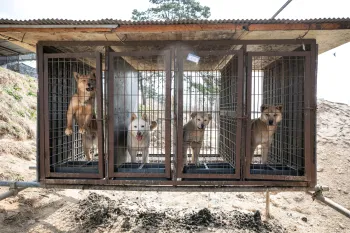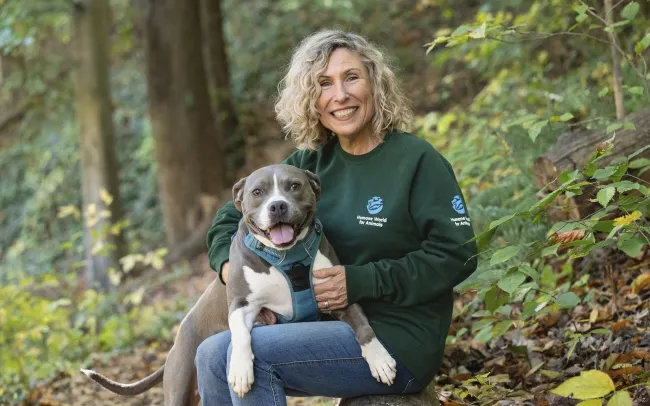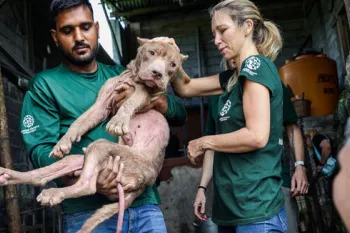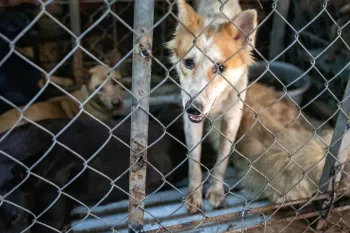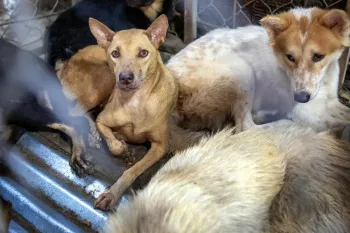Dozens of dogs are settling in at our care and rehabilitation center in Maryland after arriving last week from an illegal dog meat farm in South Korea. Members of our staff accompanied them on their flight, greeted them at JFK International Airport, rode with them to our rehabilitation center in Maryland, and witnessed the moments they took their first steps out of their crates, their first steps into a new life.
All 50 dogs who have arrived in the U.S. are receiving veterinary and behavioral treatment before moving to shelter and rescue placement partners for adoption. Seventeen additional dogs—mother dogs and puppies—will follow once they are old enough to fly. Until then, they are recovering at a shelter in Cheongju, South Korea.
Korean American actor and advocate Daniel Henney—who has been such a wonderful supporter of our campaign to end the dog meat industry in South Korea for many years—joined our team on the ground in South Korea to help us with the rescue. (His golden retriever, Juliette, was one of the dogs we rescued from a dog meat farm in 2020.) Visibly moved by the scenes of suffering at the farm, particularly the slaughter area where untold numbers of dogs had met a bloody end directly in front of terrified cage mates, he reflected on how witnessing such trauma must have exacerbated an already deeply distressing situation for these dogs.
“It was incredibly challenging to see the suffering of these dogs who have endured so much,” Henney said, adding that he’s looking forward to following their journey as they find homes in the United States and “put the dog meat industry behind them.”
Jean Chung/Humane World for Animals
On the farm in Cheongju, Henney helped Humane World for Animals’ rescue team remove some of the frightened dogs from their cages for the first time. They had endured lives of almost total deprivation. They lived in small, barren, metal cages and were denied adequate food, comfort or veterinary care; some appear to have deformed bones, possibly due to rickets caused by nutritional deficiency. This farm, which had been in operation for 40 years, was closed by Cheongju authorities in February for cruelty violations when it was discovered that the farmer had slaughtered dogs in breach of the Animal Protection Act. Humane World for Animals Korea was asked to step in to help the dogs. Local media was also on site to cover the moments when the dogs were finally freed from their cages.
His sentiments were echoed by our own team who, alongside Henney, attended to the dogs later that day as they waited at Incheon airport for their flight to the U.S. While several of the dogs were understandably nervous and cautious—they had only experienced the very worst of humanity thus far—others were giddy with excitement, their tails wagging as our team made the final preparations for their journey. As one of our rescue team members noted, these dogs had no idea that this marked the best day of their lives—the day they left the dog meat industry behind them and embarked on a journey toward love and kindness.
This is just the latest chapter in a longer story about ending the dog meat industry in South Korea, a goal we’ve held for over a decade and one that we were told, in the early days, would be impossible. But we and our local partners are in the business of achieving the impossible for animals.
Our Models for Change program (launched in 2015) worked cooperatively with farmers to permanently close 18 dog meat farms and rescue more than 2,700 dogs, providing a blueprint for how the country could help transition dog meat farmers to more humane kinds of work. When South Korea’s National Assembly finally passed a legislative ban in 2024, which comes into full effect in 2027, we were so proud to see our Models for Change program had inspired a similar government support scheme through which dog farmers are leaving the industry as the deadline looms.
I have been on the ground in the past to help our rescue team save dogs from these farms, and I will never forget the depth and scale of animal suffering there. Dogs suffer immensely on dog meat farms, both physically and mentally, before their lives are put to an end by electrocution.
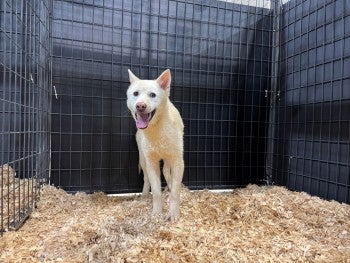
Kirsten Peek/Humane World for Animals
About 40% of dog farms in South Korea have closed since the ban on dog meat farming was passed in January 2024. The Ministry of Agriculture anticipates that ratio will reach 60% by the end of this year. And the latest opinion surveys show that most South Koreans (86%) don’t have any interest in eating dog meat.
As South Korea continues to shut down its dog meat farms, restaurants and slaughterhouses, we are also working in Viet Nam, India and through local partner groups in China and Indonesia to end the dog and cat meat trade. It is profoundly difficult work, but we will not rest until we see such cruelty finally abolished.
Back on the farm in Cheongju, when the last dog had been rescued and our transport truck set off for the airport, the farm was eerily quiet. Our colleague Haewon Lee expressed a mix of emotions—joy that these dogs will get a new life far away from the suffering they had endured, but sadness at all those for whom change had not come quickly enough. “They are gone but not forgotten,” she said, amid the stillness of the now—and forever—empty farm.
